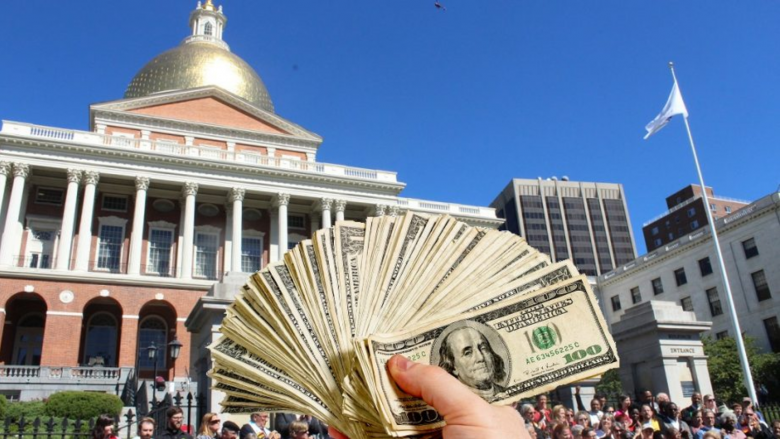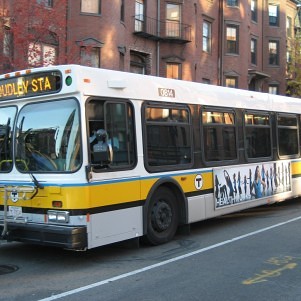Proposed Massachusetts House Budget Wouldn’t Cut Taxes Despite Massive Surplus
By State House News Service | April 14, 2022, 10:58 EDT

By Colin Young
State House News Service
Acknowledging that surplus tax collections and federal aid have kept Massachusetts afloat through the darkest days of the pandemic, House leadership on Wednesday introduced a nearly $50 billion budget for fiscal year 2023 that Speaker Ron Mariano said will reinvest in the state’s lower- and middle-class residents and gird the post-COVID economy for “tough times” in the future.
The House Ways and Means Committee’s budget recommendation, which totals $49.629 billion and is expected to be debated the week of Monday, April 25, would increase spending by $2.015 billion, or 4.23 percent over the current year’s budget, and proposes to spend $1.398 billion, or 2.9 percent, more than Governor Charlie Baker recommended in his January budget filing.
In addition to the early education and workforce development initiatives that Mariano and Ways and Means chairman Aaron Michlewitz (D-North End) rolled out Monday, April 11, the House budget would also boost local aid, fully fund the next year of the 2019 school finance reform law known as the Student Opportunity Act, eliminate communication costs for incarcerated people and their families, provide free school lunches for another year, and push the state’s stabilization fund to an estimated balance of $6.55 billion by the end of June 2023.
“We are on our way towards filling some of the holes that were created during the pandemic with a $49.6 billion spending package that we think addresses a lot of the needs, and it’s based on state tax collections that have been very strong [and] a lot of help from the federal government,” Mariano said Wednesday, April 13.
The budget includes $6 billion for Chapter 70 education aid (an increase of $485 million over the current budget), increases the minimum per-student aid amount from $30 to $60 (the Massachusetts Municipal Association had requested $100), accelerates by one year the charter school reimbursement process, and increases higher education scholarship funding by more than $25 million.
There is also $853 million for housing initiatives, including $150 million for the rental voucher program (an increase of $20 million over Baker’s budget plan), $140 million for the Residential Assistance for Families in Transition program ($60 million more than the governor proposed), and $100 million for homeless shelters.
The budget would fully fund the Transitional Aid To Families With Dependent Children program at $343 million and the Emergency Aid To The Elderly, Disabled, and Children program at $137 million. Caseloads for those programs have persisted above pre-pandemic levels, with the Emergency Aid To The Elderly, Disabled, and Children program at a record high.
The University of Massachusetts system would get $653 million under the House budget with another $326 million allotted to state universities and $337 million for community colleges. The House is proposing $156 million in scholarship funding, which would represent an increase of more than $25 million over the current year.
University of Massachusetts president Marty Meehan said the House budget plan “makes critical investments in our 75,000 UMass students by funding increases in financial aid and support for behavioral health services while also investing in our workforce and partnering with the university to confront historic inflation.”
The $638.4 million for workforce development baked into the House budget includes $230 million for Chapter 257 rates for health and human service workers, $60 million for adult education, more than $28 million for youth-at-risk summer jobs, more than $20 million for career technical institutes, and $15 million for the state’s one-stop career centers.
Environmental services are funded at $349.7 million in the House budget plan, a slight increase of $7.8 million over what Baker proposed in January. Department of Conservation and Recreation state parks would see $78.7 million ($5.2 million more than Baker’s proposal) while $72.8 million would be directed towards environmental protection efforts, including for implementation of the 2021 climate roadmap law.
“This budget shows commitment to environmental agencies, and we are grateful to Chair Michlewitz and the House for continuing to provide critical funding for the understaffed agencies, particularly the newly created environmental justice line item,” Environmental League of Massachusetts Action Fund executive director Casey Bowers said.
On the policy front, the House budget would require that the state Department of Correction, county sheriffs, and the state Department of Youth Services provide telephone calls free of charge for incarcerated people and their family members on the other end of the line. Incarcerated people and their families currently spend $14.4 million per year on telephone calls, Michlewitz said. Connecticut is the only state to already have such a free-calls policy, he said.
At a cost of $110 million, the House budget also proposes to provide universal school meals for all school children across Massachusetts for at least the next year as a federal program doing the same is due to expire in the coming months.
Largely mirroring a proposal in Baker’s budget plan, the House proposes to increase the current assessment on in-state acute and non-acute hospitals from a total of $428 million to $880 million and to put that money back into the health care system to help community hospitals. The Massachusetts Taxpayers Foundation said the existing assessment “expires in October and, without further legislative action, would revert to $165 million in fees dedicated to the Health Safety Net Trust Fund.”
Reinvest or Relief?
Michlewitz said the budget his committee released “presents the commonwealth with a unique opportunity to invest in the middle class and start to tackle some of the challenges that a post-COVID economy has created.”
Massachusetts generated a surplus of more than $5 billion last fiscal year and is already running at least $1.5 billion ahead of expectations for this fiscal year. On top of tax revenue, the state still has more than $2 billion of American Rescue Plan Act money to put to use in the coming years and a record amount of money socked away in the stabilization fund.
The state’s strong revenue performance has led to a chorus calling for tax relief for residents who are also dealing with higher prices across the board, but Mariano and Michlewitz made clear Wednesday that they think the money will do more good if the Legislature spends it in a targeted way rather than putting it back into taxpayers’ pockets.
“With growing revenue returns from the state, a record $5.76 billion expected dollars in our rainy day fund by the end of this fiscal year, this once-in-a-generation opportunity allows us to build for a better future, one that is more resilient, more equitable, and more rewarding for all of us in the commonwealth,” Michlewitz said.
Mariano had announced Monday, April 11 that the House budget would not include any of Baker’s proposed $700 million worth of tax breaks. Asked Wednesday why the House decided to leave those out, the speaker said, “Well, we felt they weren’t necessary at the time.”
The House’s decision not to pursue tax relief in its budget was criticized Wednesday by Republican candidate for governor Chris Doughty and Republican candidate for lieutenant governor Kate Campanale, a former state representative.
“While I understand the need to ‘reinvest’ in programs, the legislature seems to be forgetting that the taxpayers might need to reinvest in their household budgets to get through these tough financial times,” Doughty said.
The Massachusetts Fiscal Alliance echoed Doughty’s statement and said the “best thing the House could do is give money back to the taxpayers so middle class families and working people can decide how to best spend their money.”
“The House leadership is essentially saying they know how to spend our money better than we the taxpayers do,” MassFiscal spokesman Paul Craney said.
Mariano pointed to the House’s funding for early education and child care as the kind of investment that will have an outsized impact on the state’s workforce and economy.
“There are many things that we can spend our money on and we chose to do that because I think these programs in the early childhood and day care support systems are the underpinning of our middle and lower class workforce,” Mariano said. He added, “And I really feel, and thank goodness the chairman agrees, that strengthening these underpinnings is the most important thing we can do right now.”
The Center on Budget and Policy Priorities supported the position that Mariano and Michlewitz are taking with the fiscal year 2023 budget, arguing that “enacting costly and permanent tax cuts based on temporary budget surpluses would be a mistake” and that state lawmakers “should instead prioritize efforts to support people and communities hit hardest by the pandemic and its economic fallout.”
“Massachusetts has a choice: to improve families’ economic well-being and make progress on racial and gender equity by protecting — and enhancing — its ability to raise adequate and fair revenues and to use those resources for initiatives that help more people share in the state’s prosperity, or to compromise the state’s future through misguided tax cuts for the wealthy,” Center on Budget and Policy Priorities senior policy analyst Samantha Waxman wrote in a report released Tuesday, April 12. “The first choice would enable the state’s leaders to prioritize those hit hardest by the pandemic, while also bolstering the state’s long-term ability to provide good schools, health care, and other services.”
Inflation and Other Cautionary Signs
While the House budget proposal would increase spending by more than 4 percent over the current budget, Mariano pointed out that inflation “shrinks the rate of expansion” since every line item would need an increase to maintain its spending power. On Tuesday, federal officials announced that inflation hit 8.5 percent in March, the fastest 12-month rate of growth in prices since 1981.
“That was one of the running discussions that we had throughout the last couple of months,” Michlewitz, who helms the budget-writing Ways and Means Committee, told reporters Wednesday. “You see a lot of increases in this budget, but there are certainly a lot of rising costs for many of these accounts and many of these agencies. And so while you’re going to see a larger number in a lot of them, it definitely takes a chunk out of what we’re trying to accomplish and it’s certainly something that we have to continue to be mindful of as we go forward.”
The House budget also looks to bolster the state’s stabilization fund, the savings account that serves as a reserve in case of an economic downturn, with a deposit of at least $785.7 million in fiscal year 2023. Asked why the House is continuing to boost the rainy day fund rather than deploying that money in the annual budget, Mariano suggested darker economic days could be ahead for the Bay State.
“These good times may not roll forever. We want to make sure that we have money in case there is a sudden downturn. You know, we’re on the brink of major confrontations in Europe, the oil production is being cut way down; if I was an economic prognosticator, I would think we were in for some tough times,” the speaker said. “So obviously we wanted to strengthen our ability to pivot if revenues do take a downward plunge.”
New to NewBostonPost? Conservative media is hard to find in Massachusetts. But you’ve found it. Now dip your toe in the water for two bucks — $2 for two months. And join the real revolution.












